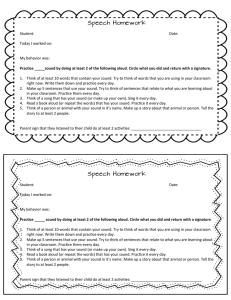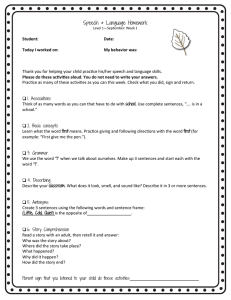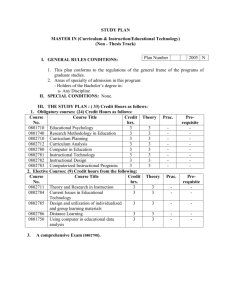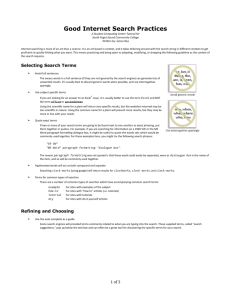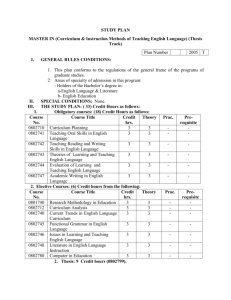Document 11961494
advertisement
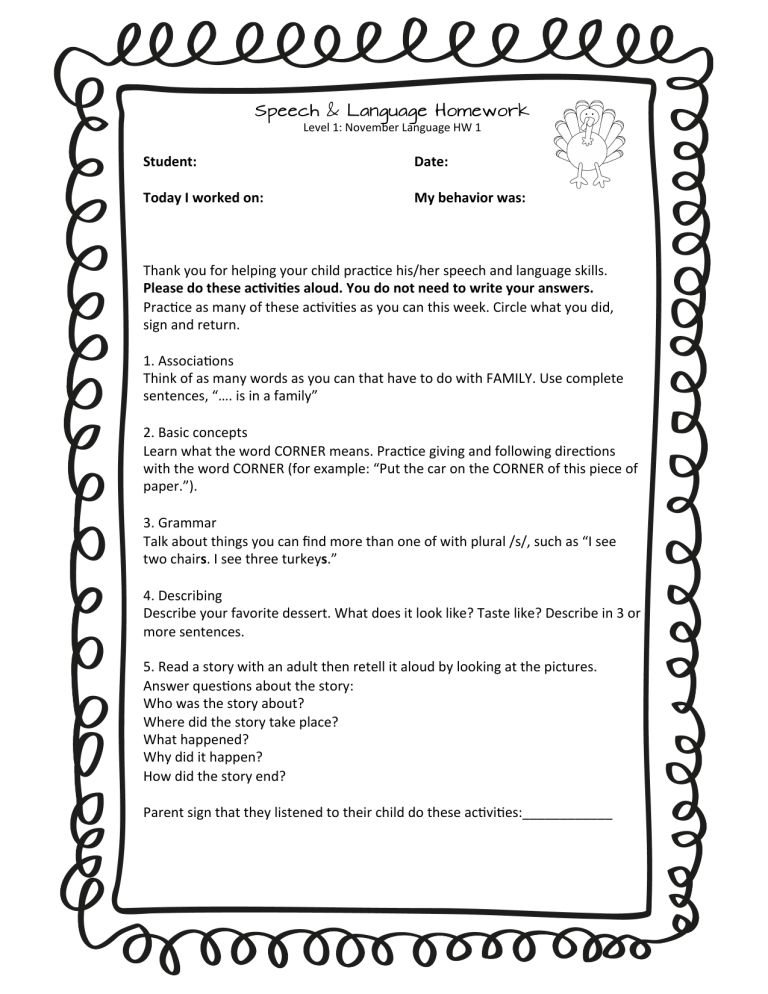
Speech & Language Homework Level 1: November Language HW 1 Student: Date: Today I worked on: My behavior was: Thank you for helping your child prac<ce his/her speech and language skills. Please do these ac;vi;es aloud. You do not need to write your answers. Prac<ce as many of these ac<vi<es as you can this week. Circle what you did, sign and return. 1. Associa<ons Think of as many words as you can that have to do with FAMILY. Use complete sentences, “…. is in a family” 2. Basic concepts Learn what the word CORNER means. Prac<ce giving and following direc<ons with the word CORNER (for example: “Put the car on the CORNER of this piece of paper.”). 3. Grammar Talk about things you can find more than one of with plural /s/, such as “I see two chairs. I see three turkeys.” 4. Describing Describe your favorite dessert. What does it look like? Taste like? Describe in 3 or more sentences. 5. Read a story with an adult then retell it aloud by looking at the pictures. Answer ques<ons about the story: Who was the story about? Where did the story take place? What happened? Why did it happen? How did the story end? Parent sign that they listened to their child do these ac<vi<es:____________ Speech & Language Homework Level 1: November Language HW 2 Student: Date: Today I worked on: My behavior was: Thank you for helping your child prac<ce his/her speech and language skills. Please do these ac;vi;es aloud. You do not need to write your answers. Prac<ce as many of these ac<vi<es as you can this week. Circle what you did, sign and return. 1. Associa<ons Name as many things that go on the KITCHEN TABLE as you can. Use complete sentences, “You find a ….. on the table.” 2. Basic concepts What does AWAY FROM mean? Prac<ce giving and following direc<ons with the words AWAY FROM (for example: “Move the car away from the truck. Fly the airplane away from the house.”). 3. Grammar Prac<ce coun<ng items. Make sure to use plural /s/ on everything that is more than one (for example: “One book. Two books. Three books. Four books.”). 4. Describing Describe a turkey. What does it look, smell, feel, move, sound like? Describe it in 3 or more sentences. 5. Read a story with an adult then retell it aloud by looking at the pictures. Answer ques<ons about the story: Who was the story about? Where did the story take place? What happened? Why did it happen? How did the story end? Parent sign that they listened to their child do these ac<vi<es:____________ Speech & Language Homework Level 1: November Language HW 3 Student: Date: Today I worked on: My behavior was: Thank you for helping your child prac<ce his/her speech and language skills. Please do these ac;vi;es aloud. You do not need to write your answers. Prac<ce as many of these ac<vi<es as you can this week. Circle what you did, sign and return. 1. Associa<ons Name as many THANKSGIVING items as you can. Use complete sentences, “A……. is a Thanksgiving item.” 2. Basic concepts What does NEAR mean? Prac<ce giving and following direc<ons with the word NEAR (for example: “Put the spoon NEAR the fork. Put the shirt NEAR the shoes.”). 3. Grammar Prac<ce using plural /s/ for everything you can find more than one of on your body. For example, “Two eyes. Ten toes. Ten fingers.” 4. Describing What does your family do for Thanksgiving? Who do you see? What do you eat? Describe in 3 or more sentences. 5. Read a story with an adult then retell it aloud by looking at the pictures. Answer ques<ons about the story: Who was the story about? Where did the story take place? What happened? Why did it happen? How did the story end? Parent sign that they listened to their child do these ac<vi<es:____________ Speech & Language Homework Level 2: November Language HW 1 Student: Date: Today I worked on: My behavior was: Thank you for helping your child prac<ce his/her speech and language skills. Please do these ac;vi;es aloud. You do not need to write your answers. Prac<ce as many of these ac<vi<es as you can this week. Circle what you did, sign and return. 1. Describing Describe a classroom with as many describing words as you can: think what it looks like, sounds like, is used for, where it is located, what you do with it, etc. Use complete sentences. 2. Vocabulary Learn a new word and use it in 2 different sentences. The word I learned was:_______________ Word sugges<ons: bare, float, peak Describe the word. Use it in at least one sentence. Can you think of a synonym (word that means the same)? Can you think of an antonym (word that means the opposite)? 3. Grammar Some ac<on words (verbs) are irregular in the past tense. This means they do not end with -­‐ed. Use the following words in the past: “Yesterday I …(eat, drink, drive).” 4. Think about and explain Describe what you might see or hear on a farm. How is this different from what you might see or hear in the city? 5. Read a story with an adult then together describe: Characters Where and when the story takes place Problem in the story Events of the story How the problem was solved Parent sign that they listened to their child do these ac<vi<es:_______________ Speech & Language Homework Level 2: November Language HW 2 Student: Date: Today I worked on: My behavior was: Thank you for helping your child prac<ce his/her speech and language skills. Please do these ac;vi;es aloud. You do not need to write your answers. Prac<ce as many of these ac<vi<es as you can this week. Circle what you did, sign and return. 1. Describing Describe a turkey with as many words as you can think of: what does it look like, smell like, sound like? Use complete sentences. 2. Vocab Learn a new word and use it in 2 different sentences. The word I learned was:_______________ Word sugges<ons: aAen;on, evening, support Describe the word. Use it in at least one sentence. Can you think of a synonym (word that means the same)? Can you think of an antonym (word that means the opposite)? 3. Grammar Some ac<on words (verbs) are irregular in the past tense. This means they do not end with -­‐ed. Use the following words in the past: “Yesterday I …(see, wear, throw).” 4. Think about and explain What is the yummiest food you’ve ever eaten? Where were you when you ate it? Describe how it tasted and how it made you feel. 5. Read a story with an adult then together describe: Characters Where and when the story takes place Problem in the story Events of the story How the problem was solved Parent sign that they listened to their child do these ac<vi<es:_______________ Speech & Language Homework Level 2: November Language HW 3 Student: Date: Today I worked on: My behavior was: Thank you for helping your child prac<ce his/her speech and language skills. Please do these ac;vi;es aloud. You do not need to write your answers. Prac<ce as many of these ac<vi<es as you can this week. Circle what you did, sign and return. 1. Describing Describe your bathroom with as many describing words as you can: what does it look like, smell like, feel like, etc. Use complete sentences. 2. Vocabulary Learn a new word and use it in 2 different sentences. The word I learned was:______________________ Word sugges<ons: chew, fresh, past Describe the word. Use it in at least one sentence. Can you think of a synonym (word that means the same)? Can you think of an antonym (word that means the opposite)? 3. Grammar Some ac<on words (verbs) are irregular in the past tense. This means they do not end with -­‐ed. Use the following words in the past: “Yesterday I …(sing, give, come).” 4. Think about and explain Talk about what you usually do for Thanksgiving. Do you celebrate this holiday? What tradi<ons do you have? Use complete sentences. 5. Read a story with an adult then together describe: Characters Where and when the story takes place Problem in the story Events of the story How the problem was solved Parent sign that they listened to their child do these ac<vi<es:_______________ Speech & Language Homework Level 3: November Language HW 1 Student: Date: Today I worked on: My behavior was: Thank you for helping your child prac<ce his/her speech and language skills. Please do these ac;vi;es aloud. You do not need to write your answers. Prac<ce as many of these ac<vi<es as you can this week. Circle what you did, sign and return. 1. Idioms/Expressions What does “stuffed” mean in the following sentence: “She ate all the turkey and now she is stuffed!” Make up your own sentence. 2. Vocabulary Learn a new word and use it in 2 different sentences. The word I learned was:____________ Word sugges<ons: clever, grace, pas;me Describe the word. Use it in at least one sentence. Can you think of a synonym (word that means the same)? Can you think of an antonym (word that means the opposite)? 3. Grammar Use the word “however” in a sentence (for example: “I would eat all my turkey, however, I ate too many potatoes already.”). Use the words “if…then” in a sentence (for example: “If the rain stops, then we can go out to play.”). 4. Think about it and explain Make up a fall adventure. Where would you go? What would you do? Is this a special thing to do in the fall or could you do it any <me of year? Use complete sentences to describe. 5. Read a story with an adult then together describe: Characters Sefng of the story Problem in the story Events of the story How the problem was solved Then explain why the story was interes<ng or what could have made it beger. Parent sign that they listened to their child do these ac<vi<es:_______________ Speech & Language Homework Level 3: November Language HW 2 Student: Date: Today I worked on: My behavior was: Thank you for helping your child prac<ce his/her speech and language skills. Please do these ac;vi;es aloud. You do not need to write your answers. Prac<ce as many of these ac<vi<es as you can this week. Circle what you did, sign and return. 1. Idioms/Expressions What does “cold turkey” mean in the following sentence: ”I’m going to stop ea<ng candy cold turkey." Make up your own sentence. 2. Vocabulary Learn a new word and use it in 2 different sentences. The word I learned was:____________ Word sugges<ons: absorb, doze, privilege Describe the word. Use it in at least one sentence. Can you think of a synonym (word that means the same)? Can you think of an antonym (word that means the opposite)? 3. Grammar Use the word “as soon as” in a sentence (for example: “As soon as I drink my milk, I will eat my dessert.”). Use the word “even if” in a sentence (for example: “Even if he waited four more hours, his plane would never arrive.”). 4. Think about it and explain Explain how to cook something using step-­‐by-­‐step instruc<ons. Start with the first step and end when the dish is complete. Use complete sentences. 5. Read a story with an adult then together describe: Characters Sefng of the story Problem in the story Events of the story How the problem was solved Then explain why the story was interes<ng or what could have made it beger. Parent sign that they listened to their child do these ac<vi<es:_______________ Speech & Language Homework Level 3: November Language HW 3 Student: Date: Today I worked on: My behavior was: Thank you for helping your child prac<ce his/her speech and language skills. Please do these ac;vi;es aloud. You do not need to write your answers. Prac<ce as many of these ac<vi<es as you can this week. Circle what you did, sign and return. 1. Idioms/Expressions/Expressions What does “count your blessings” mean in the following sentences: “You should count your blessings! You have a great school, friends, and family. ” Make up your own sentence. 2. Vocabulary Learn a new word and use it in 2 different sentences. The word I learned was:____________ Word sugges<ons: adopt, fortunate, resident Describe the word. Use it in at least one sentence. Can you think of a synonym (word that means the same)? Can you think of an antonym (word that means the opposite)? 3. Grammar Use the word “while” in a sentence (for example: “While washing the dishes, Jenny listens to music.”). Use the word “yet” in a sentence (for example: “I feel full yet I s<ll want to eat more.”). 4. Think about it and explain Describe the best Thanksgiving you can imagine. Describe each part of the day and explain what would make it great. Use complete sentences. 5. Read a story with an adult then together describe: Characters Sefng of the story Problem in the story Events of the story How the problem was solved Then explain why the story was interes<ng or what could have made it beger. Parent sign that they listened to their child do these ac<vi<es:_______________
